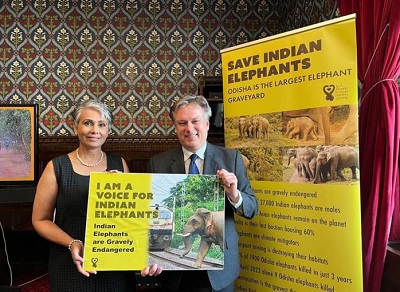New Delhi, (Samajweekly) With only 40,000 of Asian elephants left on the entire planet and 60 per cent in India, biologist and conservationist Sangita Iyer is rallying hard to save the endangered pachyderms in their last bastion, India.
Canada-based Iyer, along with Conservative MP Henry Smith, recently addressed the UK Parliament, imploring Indian authorities to act urgently in the wake of the alarming number of elephant deaths caused by electrocution, poaching and habitat loss, among other growing threats.
As part of their collaborative efforts, they are also encouraging lawmakers, business leaders, and celebrities to do their part in saving the indispensable natural climate champions before it’s too late.
With only 27,000 left in India, saving them in their last stronghold is critical in order to save the species, according to Iyer, founder of Voice for Asian Elephants Society, which was created in 2016 to protect wild and captive elephants of India.
In her presentation before the UK Parliament, Iyer said that the threats facing the endangered Asian elephants have reached a crisis point in India where they are being killed at an alarming rate.
The parliamentary presentation also called the state of Odisha the “largest elephant graveyard”.
In the last 10 years almost 1,200 elephants have been killed across India. And in the last three years, 245 of them have been killed in the central state of Odisha state where mining is rampant.
The mega herbivores have already lost 80 per cent of their habitats to reckless development such as mining, electrocution, railways, roadways, and agriculture.
Forest fires are also on the rise, most of them set off by arsonists and poachers to lure the wildlife and trap them.
“The plight of India’s heritage animal elephant is soul ravaging. Electrocution deaths are tarnishing India’s global reputation… Odisha mining companies are destroying forests and poisoning the lakes and rivers. 245 endangered Asian elephants killed in three years, 26 electrocuted,” Iyer wrote in a series of tweets addressing top politicians.
In a written reply in the state Assembly on March 14 this year, Odisha Forest and Environment Minister Pradip Kumar Amat said that as many as 784 elephants have died in the state in the last decade, 2012-13 to 2021-22.
Iyer argues that protecting elephants is vitally important not only for the ecosystems in India, but also for countries around the world.
“Why should the world care? Elephants are climate mitigators. Climate change impacts every nation. What happens in India will reverberate across the planet.
“Countries may have borders, but climate change does not. We are all connected in this magnificent web of life, so what happens to elephants in India will have a cascading effect. Recent amendments to the Wildlife Protection Act will embolden elephant captures, liberalise exploitation and make the situation dire,” Iyer said in a media note.
An International Monetary Fund study elaborates the critical role of elephants in mitigating climate change.
It calculates the monetary and ecological value of one African forest elephant at $1.75 million in terms of carbon sequestration.
“The world needs to pay attention to the ecological decimation unfolding in India, as it houses 18 per cent of the world’s human population. Every nation is interconnected,” Iyer said in one of her tweets.
At 1.14 billion people, India houses 18 per cent of the world’s population and jostling for space is intense giving rise to man-animal conflict.
Iyer’s recent initiative for elephant conservation includes acquisition of a four-acre plot in Kerala’s Nilambur region, dedicated to “re-wilding” and creating a safe passage for over 340 elephants.
Her award-winning documentary and book, ‘Go in Shackles’, exposed the plight of caparisoned temple elephants in Kerala that are exploited for profit in the name of religion.
The 2016 documentary was nominated at the UN General Assembly and was featured at the International Film Festival of India.
A National Geographic explorer, Iyer has produced a 26-part short documentary series about Asian elephants, using the National Geographic Society storytelling award.










